By Kira Bunkholt 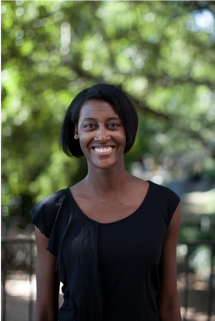 “I grew up saying, even if you're an actor, your role ends at some point, like, the play or the show or the movie is going to end, and you have to take your costume off. But why would you bother walking around in a costume? So I try to use this thinking in fiction and nonfiction, you know, the sense of not being afraid of these differences, but really just embracing and accepting yourself and others.” - Vonetta Young As a memoirist, essayist, and short storyist, Vonetta Young creates space for herself by leaning into contradictions instead of masking them, or putting on a costume. In her work, she explores complex family dynamics, Millennial perspectives on Christianity, the relationship between wealth and blackness, or what she calls “the messy intersection of race and class in upwardly mobile Black families.” And, most importantly, she looks at how all of these matters relate to identity and belonging. Adding to Young’s long list of publications, this issue of Grace & Gravity features Young’s short story, “Sand and Salt” in which her main character, Selma, struggles to maintain close connections with her family after achieving a wealthier status, illustrating the alienation many low-income black people face as they gain education and, in turn, more financial resources. After reading her short story, I had the wonderful opportunity to interview her about her writing journey, the contradictory aspects of identity, deconstructing the view of blackness as a monolith, and her newer role as an editor for both the Rumpus and The Offing.
2 Comments
by demory hobbs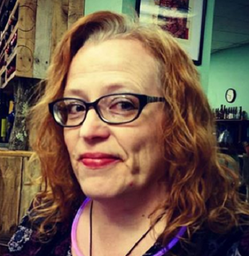 Heather Davis balances writing poetry, fiction, and non-fiction with working full-time, being a wife, being a mother, and being a person who needs some sleep occasionally. Her book of poems The Lost Tribe of Us won the Main Street Rag Poetry Book Award. She has poems forthcoming in Gargoyle, Northern Virginia Review, and Fledgling Rag. For Furious Gravity, Heather has written a non-fiction essay “Be the Ocean: Everyday Lessons in Rage.” The piece explores parenting a neurodiverse child and how much parents can learn from their children. It’s a must-read for anyone who, like me, admires a writer who can bring the reader into her world in a way that is authentic and empathetic. I had the opportunity to interview Heather about the piece, her writing practice, and all of the sweet surprises life brings. By Narendra Desirazu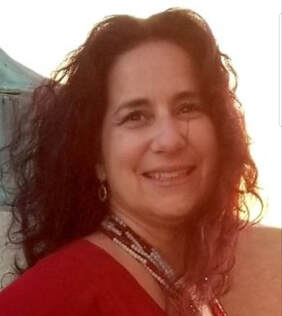 Wendy Goodman is a writer, and a trademark attorney by day. While she has been writing through her legal career spanning over 20 years, all that writing was mostly for her professional work—legal briefs, legal arguments and so on; it wasn’t writing “from the soul.” Over the last couple of years, she started writing personal essays. She felt that she wanted to write about things emotionally: write how she felt. Wendy signed up for a writing workshop at The Writer’s Center in Bethesda. Although she had started writing creatively even before joining the workshop group, her workshop cohort helped her improve her writing by critiquing her work and offering extensive feedback. Getting feedback from professional writers helped her gain confidence in her work and she started sending out her writing to journals. Initially, she had many rejects, which we will talk about this later in her interview, but slowly she also has had some successes. Wendy had a non-fiction piece, “How A Meeting With Philip Roth Brought Me Closer To My Father,” published in the online journal Hevria.com, a second non-fiction piece “The Reynolds Pamphlet” published in the print journal, Ocotilla Review, and a fiction piece, “Chevy Chase Club,” was selected as a runner up in a contest held by Two Sisters Writing & Publishing. She is going to have her non-fiction work “The Toupee” published in the DC Women’s Anthology, Furious Gravity. Adhering to the social distancing conventions of these times of coronavirus, I interviewed Wendy over the phone. Here is the interview. By Esteban Bachelet 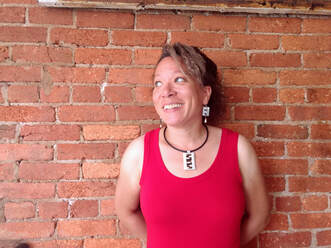 Tara Campbell grew up in a unique household with a mix of TV, laughter, and good humor. This wacky childhood would go on to spark an imaginative career as writer interested in cross-genre and speculative fiction. Appearing in various journals, the stories remain fresh and imaginative. I spoke to Tara not only to gain deeper insight into “Barry Knows Best” but also to talk about how she makes the speculative magic in her work come to life. By Mae Zhang McCauley 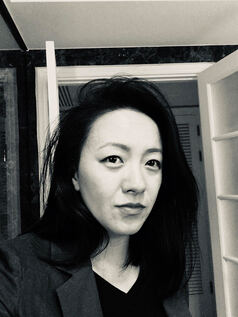 From movies, to politics, literature, pop culture, philosophy and more, the West has always been fascinated with “the East” and more specifically—China. It’s a form of Orientalism in itself that is able to co-opt people’s lived experiences and own histories. In Daien Guo’s nonfiction essay, “The China Expert,” readers are introduced to Guo’s China: “My China is the world of a young child; it exists only in my memories and in the memories of those who were with me, who cared for me.” Daien immigrated from China to the United States when she was seven years old and in the past, she has written both “China” themed pieces and “non-China” pieces. However, it is her China pieces that seem to gain more traction, because as Daien notes, “America, and the West, has always been fascinated by China.” Daien stresses that she is self-conscious about “not pandering to the West’s ‘China fascination’ in her pieces.” Whenever she writes about something that is China-related, Daien tries to ensure that “it’s authentic to me and my voice—that it’s not sentimental or cloying, or playing up to something that people expect.” “The China Expert” illustrates Daien’s vivid childhood memories in 1980s southwest China and how they reclaim what China means to her in the present. I had the opportunity to discuss the important role of memory in this process, parenting, pen names (and more!) with Daien. by Matt Leistra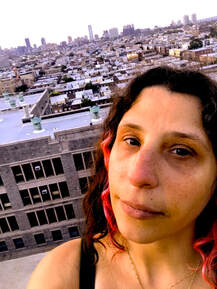 Jessie Rothwell is many things. She’s a former resident of Los Angeles, and a former and current resident of Washington DC. She’s currently a teacher, and it’s one the few jobs she’s had that pays her to do something she cares about. For that reason, she doesn’t let how she makes money define her. “It’s such a big thing in DC and LA,” she says. “The first thing out of someone’s mouth is ‘what you do you do?’ and I’ve tried to start flipping it on its head by saying that I do yard work, I do crossword puzzles, I do art and crafts. Two of the artistic mediums she’s most drawn to are music and writing. Her piece “Salvation” by Black Rebel Motorcycle Club blends both into an immersive experience that transports the reader to a Hollywood hilltop just before dawn. Salvation is one of nearly 20 pieces Rothwell has written that draw their inspiration from songs. Rather than writing about the songs themselves, however, she describes what was happening in her life when she listened to them: “It’s a way for me to take these songs that have been important to me and helped me in some moments and turn them into a different kind of art.” In Salvation, an energizing, second-person narrative invites the reader to spend the night crammed in the back of Rothwell’s car, yearning for sleep as they seek refuge from a bedbug-infested hotel on the streets of her old neighborhood. The raw, stream-of-consciousness-style piece ends with the chorus of the song Salvation and a command to the reader, one that weighs far heavier than a few drops of ink in the era of Coronavirus: “Do you feel alive? Can you feel alive? And you wonder.” I spoke to Rothwell about her love of music, BRMC (as true fans of the band refer to them) and the current Coronavirus pandemic. Below is an edited transcript of our conversation: By Cassie Osvatics  After a 35 year career as a Licensed Clinical Social Worker (LCSW), Shaileen Backman is entering a new chapter as a writer. Her story Old Girls Tap discusses her experience of getting back into tap dancing when she was 49. Old Girls Tap is witty, comical, and above all, honest. Backman doesn’t hold back in admitting her own faults. “I saw myself as being judgmental. Then I overcame it as we all bonded in this joyful ending,” Backman stated during our interview. In her semi-retirement, Backman is putting her experience as an LCSW into writing a book about grief after recognizing a serious need for literature about the topic. Her contribution to the upcoming Grace and Gravity is her first published work, an accomplishment she is ecstatic about. At 62, Shaileen Backman is proving that it’s never too late to follow your dreams. By Georgia Lin Monique Hayes’ short story Contralto appears in Furious Gravity, Vol. IX of the Grace and Gravity series featuring works by women writers in the D.C. region. “Contralto” refers to Marian Anderson, a renowned African-American opera singer who possessed an exceptionally low vocal range – a contralto – and whose performing experiences in the 1930s marked pivotal historical moments for racial integration in the United States. In 1939, Anderson was barred from performing at Constitution Hall in Washington, D.C., then controlled by the white-majority group Daughters of the American Revolution (DAR), because of her race. In response, First Lady Eleanor Roosevelt resigned her membership in the DAR and arranged for Anderson to sing on the steps of the Lincoln Memorial on Easter Sunday to an audience of 75,000 people (Encyclopædia Britannica, “Marian Anderson”). Monique’s powerful story of Amelia, a young outspoken African-American pianist who witnessed the racial discrimination against Anderson, resonated with me as a woman of color in the classical music industry. I am a trained mezzo-soprano singer who decided against attending opera school (and now studies social equity and critical race theory) precisely because of the inherent racism and inequities in the industry that most impacts multiply marginalized communities. In Contralto, Amelia is reprimanded for speaking out about racial injustice in a room of white peers, exemplifying a choice people of color are often forced to make: ardently defend your beliefs and risk the consequences, or stay silent in your anger to preserve your social and economic status among the white elite? I interviewed Monique about her writing process for Contralto, prejudice in classical music, and the power of female anger as a catalyst for social change. by elizabeth edwards Whether volunteering with the Peace Corps in Bulgaria, living in Mozambique on a Fulbright grant, or working for USAID in war-torn Iraq, Jamy Bond has gone through life all over the world. It is evident in both her fiction and nonfiction that experience is what inspires her. Jamy’s writing is shaped by experiences both unforeseen, such as losing her younger sister to a car accident, and chosen, like dodging bombs as a daily part of work in Iraq. Both aid her in creating work that refracts those personal experiences into a fragment of collective human experience. As I read Jamy’s piece, “Learning to Fly,” I felt a heaviness of familiarity and fear. The piece anchored me with an emotional weight that only the best writing can place on a reader. Her story intertwines violence and vulnerability, desire and innocence, and fear and calm into connecting threads between the characters. As a writer, and a reader, I have found that those life experiences and emotions that expose our malleability, and train us to resist it, are those that best infuse a story with the same ability to affect people. Jamy draws out those emotions and builds from those experiences, mooring readers so deeply in the story and then finally setting us free as the story releases its grip, teaching us to fly along with the characters. Jamy explores the darker side of the human experience with equal parts grace and gravity, making her a fitting contributor to this anthology. By Ellis Carrington Caroline Bock is a lecturer for the Marymount University English department, and a participating author with the PEN/Faulkner Writers in Schools program in the Washington D.C. area. She is the author of titles Before My Eyes, Lie, and her award winning short fiction collection, Carry Her Home. She leads creative writing workshops at Politics & Prose bookstore in Washington, D.C. and at the Writer’s Center in Bethesda, MD. Bock’s piece, MINIM, is a meaningful narrative that inspires its narrator, as well as its readers, to choose life even when death seems to be right around the corner. I have had the immense pleasure to interview her about this piece below: |
Archives
May 2020
Categories |

 RSS Feed
RSS Feed